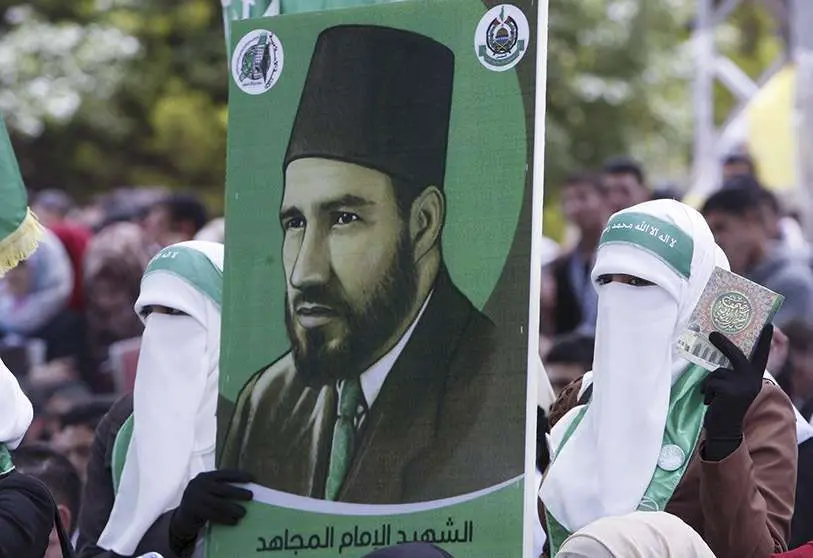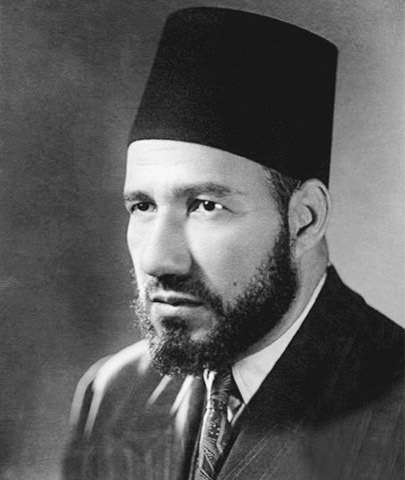Hassan al-Banna's pupils of Islamism: Will they one day take over the West?

Unlike the typical Islamist ideologue, who embodies his ideas in written works, Hassan al-Banna was the organisational ideologue par excellence, the first contemporary ideologue to bring the Islamic message to life and breathe life into it, pouring it into a militant organisation such as the Muslim Brotherhood, an organisational model that has been and continues to be a reference for Islamic associative activity throughout the world.
When Hassan al-Banna founded the Muslim Brotherhood, he placed the educational dimension among his priorities because of his great knowledge of the prophetic method of building societies and states, a method guided by the jurisprudence of the prioritised and the gradual.
Al-Banna was certain that education based on the Prophetic codes (Qur'an and Sunna), from an early age, would generate generations of believers, strong, firm in the face of the yearning for an Islamic state, capable of heeding the call of jihad when the time came.
Achieving an Islamic society and state, according to al-Banna, as he makes clear in his letters, begins with building the Muslim individual, then the Muslim home, then the community, and from there the government, followed by a caliphate, and finally all of the above culminating in world domination, overlapping stages, the core of which, as noted, is the individual, whose most fertile time frame for planting the seed of such a universal projection of Islam is undoubtedly childhood.

With the establishment of the first branch of the Muslim Brotherhood group in 1928 in the city of Ismailia, Al-Banna formed an internal group for travel and excursions called the "AL-JAWALA" (the travellers); and so with each branch of the Brotherhood in the Egyptian cities, approved the organisational declaration of the aforementioned mini groups (AL-JAWALA) at the third conference of the Brotherhood held in 1935.
AL-JAWALA were the nucleus of what was to become the "Muslim Brotherhood Scouts" (Al-Kashafat al-Aiajwan" when they were registered within the Egyptian National Scouts in 1940, thus acquiring a legal aspect and an acceptable and unsuspected social framework.
The Brotherhood opened a school to train the trainers of these groups, whose membership of AL-JAWALA has been growing dramatically, reaching 45,000 in 1945, 60,000 in 1946 and 75,000 in 1947 and 1948.
Ali Abdulhamid Mahmud, a disciple of al-Banna, says regarding the real motivation for forming these 'JAWALA' groups supposedly for travel, excursions and outdoor activities of the Brotherhood: 'The real motive for the establishment of these groups since the founding of the Brotherhood in Ismailia was not a travel group or a regular Scout group, but rather a military group that realises the idea of jihad in Islam. However, Hassan al-Banna was a wise man and aware of the stages of formation and establishment of an Islamic society, and he did not believe in mutation, but believed in evolution and that it is the law of life. Any idea must be subject to the laws of life (gradual evolution) if it is to find its way".

Al-Banna was not unaware of his surroundings, so he worked gradually in order to achieve the goals and objectives, he longed to highlight the military role and reveal the idea of jihad, but he saw that DAWA was still in its infancy and in its new phase, and the Egyptian government, and behind them the British colonisers, posed a lurking danger.
Therefore, DAWA at this stage must avoid anything that could be considered a violation of the law. At that time, in the 1930s, the formation of military organisations was not only considered a violation of the law, it was considered one of the greatest sins. For this reason, he resorted to an apparition that clothed him in the garb of law, and legality, i.e. JAWALA groups (outdoor activity and travel groups) similar to the Scouts.
Because of all the above, one of the means of activating the objectives without being interrupted in the process of gradual education was the creation of the aforementioned groups and camps by legalising them by registering them with the Scouts of Egypt. Such groups served and continue to serve as an example in the Arab world and in the West, groups with the appearance of organisational social work, but with objectives that go beyond that.
AL-JAWALA integrates groups for all ages, from children to adults, and as a great connoisseur of the essence of ideological transmission, the laws of suggestion, Al-Banna gave special importance to the groups of JAWAL children known as the JAWALA PUPILS, establishing for them a thorough educational and training plan that works on body, mind and soul and a methodology followed to this day by most of the Islamic organisational groups; The body is reinforced with outdoor activities and sports and excursions and skills in nature and with the operative, and the soul is worked on by memorising and reciting the Koran and with AL-THIKR (the prayers and the mention of Allah), the mind is worked on by reflecting on the universe, the life of the prophet and the objective of the Muslim on earth, and within a training that follows these three lines, the Islamist vision is woven and evolves.
Children who learn by observing, travelling, guided towards a future understanding of the political projection of Islam.

To prepare a strong man, capable of bearing the burdens of jihad, fighting against laziness, stagnation, instilling masculinity and pride. That is to say, customs, traditions, thought and behaviour; as many members of the Brotherhood explained, it was to reform and readjust their faulty education acquired in society; with the JAWALA PUPILS he intended to achieve a masterpiece, to create pure specimens.
Al-Banna actively participated by setting an example for his PUPILS and his future warriors, even dressing in their uniform.
The JAWALA PUPILS for Al-Banna meant the hope of creating a clean and safe construct whose original outlines are envisaged to be able to respond to the stimulus of the call to jihad when the time comes.
The idea of the JAWALA PUPILS is a reference that is still alive today in thousands and thousands of associative projects, especially in the West, groups created apparently as socio-cultural and coexistence initiatives, to encourage the integration of children and young people in Western societies, where the invisible and silent radicalisation takes its course until the moment of the call arrives.

